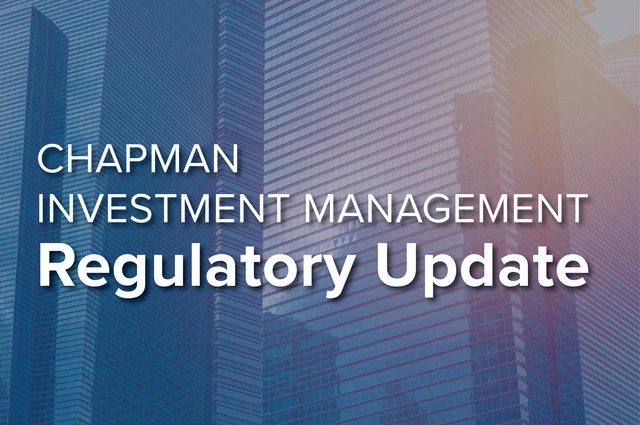- Topic: Mutual Funds/ETFs
44 matches.
Chapman's quarterly Regulatory Update contains an overview of the latest regulatory actions, market happenings, and litigation and enforcement activity in the investment management space.
Chapman's quarterly Regulatory Update contains an overview of the latest regulatory actions, market happenings, and litigation and enforcement activity in the investment management space.
Chapman acted as counsel on the registration and listing of two of the first eight spot Ethereum (ether) exchange-traded funds (ETFs) to begin trading in the United States, following the U.S. Securities and Exchange Commission (SEC) declaring the registration statements for the ether ETFs effective on July 22, 2024.
Despite recent regulatory efforts from FINRA and the SEC, industry participants continue to have no clear understanding of what qualifies a product as either “complex” or “risky.” In this article, Chapman attorneys provide insight and context for a path forward for definitive guidance regarding complex products, but also for a more rational regulatory scheme that considers a wide variety of factors. This article proposes an objective framework for broker-dealers and investment advisers to consider Defined Outcome ETFs, regardless of whether they are deemed complex under the current regulatory environment, by utilizing a well-established measure of risk to assess whether an investment in those vehicles is in a client’s best interest.
In February 2023, Perpetual US Services, LLC filed an application for exemptive relief with the Securities and Exchange Commission (SEC) that, if granted, would allow a mutual fund to create and operate an ETF share class alongside its mutual fund share classes. In the February 2024 issue of The Investment Lawyer, Chapman partners Rick Coyle, Barry Pershkow and Morrison Warren break down the history of the sought-after relief, the potential advantages to such a structure for mutual fund sponsors and shareholders, and share their insights into the SEC’s reluctance to grant such relief, while ultimately arguing that the approval of these applications is the proper step for the SEC to take.
Chapman acted as counsel on the registration and listing of three of the first spot bitcoin exchange-traded funds (ETFs) to launch in the United States, which received approval from the U.S. Securities and Exchange Commission (SEC) on January 10, 2024.
Chapman's quarterly Regulatory Update contains an overview of the latest regulatory actions, market happenings, and litigation and enforcement activity in the investment management space.
Chapman's quarterly Regulatory Update contains an overview of the latest regulatory actions, market happenings, and litigation and enforcement activity in the investment management space.
- September 2021Journal of Investment Compliance
The US Securities and Exchange Commission Division of Examinations has released its 2021 Examination Priorities. A discussion of the exam priorities is included in this article.
The Securities and Exchange Commission’s Division of Examinations has released its 2021 Examination Priorities.
The SEC has taken several actions to assist funds and advisers in light of the effects of COVID-19. Similarly, FINRA also has taken several actions to provide guidance and certain regulatory relief to its member firms.
The SEC re‑proposed Rule 18f-4, a new exemptive rule designed to provide a more comprehensive approach to the regulation of funds’ use of derivatives and certain other transactions.
The SEC's Office of Compliance Inspections and Examinations has released its 2020 Examination Priorities. This Client Alert includes a discussion of the exam priorities.
On November 25, the SEC re-proposed Rule 18f-4 under the Investment Company Act of 1940 as amended. Rule 18f-4 is intended to be a new exemptive rule that is designed to enhance the regulation of the use of derivatives by registered investment companies, including mutual funds, ETFs, closed-end funds, and BDCs notwithstanding the restrictions under the 1940 Act.
- Law360
On September 26, the SEC adopted final Rule 6c-11 under the Investment Company Act of 1940, and certain form amendments that standardize the regulatory regime governing exchange-traded funds.
On September 26, the SEC adopted Rule 6c-11 under the Investment Company Act of 1940 and amendments to Form N-1A and Form N-8B-2 that overhaul the patchwork regulatory framework that currently governs the $3.32 trillion ETF industry. The adopted rule and form amendments are largely similar, but not identical, to the versions that were proposed in June 2018.
The Securities and Exchange Commission’s Office of Compliance Inspections and Examinations has released its 2019 National Exam Program Examination Priorities.
On June 28, the Securities and Exchange Commission proposed Rule 6c-11 under the Investment Company Act of 1940 and amendments to Form N-1A and Form N-8B-2 that overhaul the patchwork regulatory framework that currently governs the $3.4 trillion ETF industry.
The Securities and Exchange Commission’s Office of Compliance Inspections and Examinations recently released its 2018 National Exam Program Examination Priorities. Highlights from the 2018 exam priorities are reviewed in this Client Alert.
The beginning of each year provides an opportunity for investment advisers to review compliance and regulatory matters, including issues related to private investment funds and commodity pools, which are briefly summarized in this alert.
The Securities and Exchange Commission’s Office of Compliance Inspections and Examinations recently released its Examinations Priorities for 2017.
The Financial Industry Regulatory Authority, Inc. recently issued its annual Regulatory Examination Priorities Letter. This alert summarizes some of the more significant issues FINRA’s letter raises.
The staff of the Securities and Exchange Commission’s Division of Investment Management has released guidance focused on disclosure issues and certain procedural requirements associated with mutual funds implementing intermediary‑specific variations to sales loads and adding new share classes.
The Financial Industry Regulatory Authority, Inc. recently filed proposed rule changes with the Securities and Exchange Commission to amend FINRA Rule 4512 and adopt FINRA Rule 2165.
The Securities and Exchange Commission recently approved proposed rule changes by the Financial Industry Regulatory Authority, Inc. that would revise certain filing requirements of FINRA Rules 2210, 2213 and 2214.
The Securities and Exchange Commission voted last Thursday to adopt changes to enhance liquidity risk management by open-end funds, including mutual funds and exchange-traded funds.
After several years of securities industry efforts, the Securities and Exchange Commission has formally proposed a rule change that would shorten the standard settlement cycle for most broker-dealer securities transactions from three business days after the trade date to two business days after the trade date.
On August 25, after approximately five years of litigation concluding with a 25-day bench trial, Judge Peter G. Sheridan issued the opinion of the U.S. District Court for the District of New Jersey in the first trial of a “manager-of-managers” theory of liability for breach of fiduciary duty.
The Securities and Exchange Commission’s Office of Compliance Inspections and Examinations recently issued a Risk Alert announcing that they will be undertaking an examination initiative focused on the risk that registered advisers may be making conflicted recommendations to their clients.
The Financial Industry Regulatory Authority, Inc. recently filed proposed changes to certain aspects of the FINRA rules governing member firms’ communications with the public. The proposed rule changes are substantially similar to those proposed by FINRA in May 2015.
Client Alert
The Financial Crimes Enforcement Network recently published its final rule under the Bank Secrecy Act of 1970, as amended on customer due diligence requirements for banks, broker-dealers, mutual funds and futures commission merchants and introducing brokers in commodities.On January 6, 2016, the staff of the Securities and Exchange Commission’s Division of Investment Management released guidance regarding registered open-end investment company payments to certain financial intermediaries that provide shareholder and recordkeeping services for investors. The staff’s guidance is designed to help fund boards oversee and evaluate whether sub-accounting fees are for distribution or non-distribution services.
- Client Alert
The Securities and Exchange Commission’s Office of Compliance Inspections and Examinations recently released its Examinations Priorities for 2016. Firms should review their policies, procedures and business activities in light of OCIE’s stated 2016 priorities.
In September, the IRS issued final regulations to clarify that controlled groups under the rules for regulated investment companies may consist of only two entities. This may cause unanticipated attributions of ownership, which would disqualify some RICs from beneficial tax treatment.
The Securities and Exchange Commission recently proposed new rules and amendments designed to enhance liquidity risk management requirements for certain open-end management investment companies, including mutual funds and exchange-traded funds.
- Client Alert
The Financial Crimes Enforcement Network recently proposed rulemaking to prescribe minimum standards for anti-money laundering programs.
- Client Alert
The Financial Industry Regulatory Authority is requesting comment on a revised proposal to adopt a new FINRA rule that would consolidate and clarify former National Association of Securities Dealers and New York Stock Exchange rules regarding discretionary accounts and transactions.
- Client Alert
The Financial Industry Regulatory Authority recently released a Regulatory Notice in which it proposed changes to certain aspects of the FINRA rules governing member firms’ communications with the public. This Client Alert is a summary of the proposed changes.
- Client Alert
The Financial Industry Regulatory Authority recently issued an interpretive letter that allows distributors of mutual funds to include related performance information in communications with institutional investors, including registered broker-dealers and investment advisers.
- Client Alert
On May 20, 2015, the Securities and Exchange Commission proposed changes to certain aspects of reporting and disclosure obligations of registered investment advisers and investment companies.
- Client Alert
The Securities and Exchange Commission staff recently announced an initiative to conduct examinations of registered investment company complexes that have not previously been examined.
In this issue:
-
FinCEN Proposed Rule on Customer Due Diligence Requirements
-
CFPB Issues First Enforcement Action for Mortgage Servicing Rules
-
Cordray Speaks about Checking Account Issues
-
- Client Alert
On June 5, 2013, the SEC proposed certain amendments to Rule 2a-7, which is the primary rule governing money market mutual funds under the Investment Company Act of 1940.
- Client Alert
The Commodity Futures Trading Commission (the “CFTC”) recently issued final rule changes:
• narrowing the exclusion from the definition of commodity pool operator (“CPO”) available to mutual funds and other registered investment companies (“RICs”) and their advisers;
• eliminating an exemption from CPO registration available to private fund operators (but keeping another exemption that had also been proposed to be eliminated);
• narrowing and rescinding certain exemptions from commodity trading advisor (“CTA”) registration;
• adding certain risk disclosure statements for CPOs and CTAs with respect to swaps; and
• making certain changes to reporting and certification obligations for entities required to register as CPOs and
• CTAs and entities relying on exclusions and exemptions from registration.









